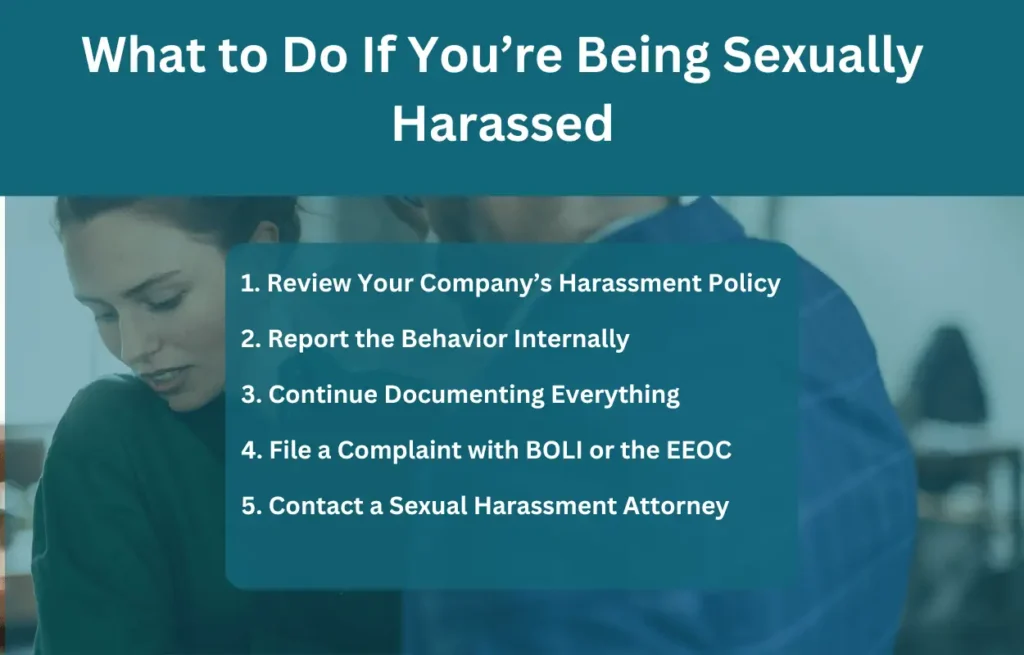Sexual harassment in the workplace doesn’t always look like what you see on TV. It isn’t always obvious, and it doesn’t have to involve physical contact to be damaging. From persistent comments to retaliation after reporting misconduct, harassment can take many forms and if you’re experiencing it, you’re not alone.
Whether you’re just beginning to question your experiences or you’ve already tried reporting them, it’s important to understand that sexual harassment is illegal under both federal and Oregon law. If you suspect you’ve been sexually harassed at work, Meyer Employment Law’s workplace harassment attorneys are here to protect your rights and help you take action.
In this article, we’ll walk you through the most common signs of workplace sexual harassment, how to document what’s happening, and what steps to take next.
Also read:
Navigating the Murky Waters of Workplace Intimidation
Wrongful Termination Under Oregon Law
5 Reasons to Hire an Oregon Employment Lawyer
What Counts as Sexual Harassment in Oregon?
Sexual harassment is defined as unwelcome verbal, visual, or physical conduct of a sexual nature that affects working conditions or creates a hostile, offensive, or intimidating environment. This includes everything from repeated inappropriate jokes to serious acts of misconduct.
There are two primary types of workplace sexual harassment:
- Quid Pro Quo Harassment: This occurs when a supervisor or manager offers employment benefits like a raise, promotion, or job security in exchange for sexual favors. It can also include threats of retaliation for rejecting such advances.
- Hostile Work Environment: This refers to unwelcome sexual behavior (verbal or physical) that interferes with an employee’s ability to work. Examples include sexually explicit jokes, touching, texts or emails, or conversations that make you feel uncomfortable or unsafe.
Under Oregon law, including ORS 659A.030 and the Oregon Workplace Fairness Act, victims of sexual harassment have strong legal protections, including an extended statute of limitations (up to five years to file a claim with BOLI).

Common Signs You’re Being Sexually Harassed at Work
Sexual harassment doesn’t always start with something overt. It often builds over time, especially if the harasser tests boundaries or tries to disguise their actions as “jokes.” Here are some of the most common red flags:
1. Unwanted Touching or Physical Contact
Even brief or “accidental” contact can constitute harassment if it’s unwelcome. This includes hugging, brushing against you, or touching your shoulder or waist.
2. Sexually Suggestive Comments or Jokes
Repeated jokes about your appearance, clothing, body, or sex life even if presented as humor—are inappropriate and can create a hostile environment.
3. Repeated Requests for Dates or Sexual Attention
If you’ve declined someone’s advances and they continue to ask you out, compliment you suggestively, or try to initiate romantic contact, it may be harassment.
4. Sexual Content in the Workplace
Receiving sexually explicit images, links, memes, or emails whether from coworkers, clients, or supervisors—can be grounds for legal action.
5. Retaliation After Rejecting Advances
Have you been demoted, transferred, excluded, or treated unfairly after standing up for yourself? Retaliation is illegal and often goes hand-in-hand with harassment.
6. Staring, Leering, or Inappropriate Gestures
Prolonged staring, suggestive gestures, or comments about your body can create an uncomfortable and intimidating atmosphere.
7. Isolation or Exclusion from Team Activities
If you’re suddenly excluded from meetings, group chats, or work events after speaking up, it could be retaliation tied to harassment.
8. Harassment from Non-Employees
Sexual harassment can also come from clients, vendors, or customers. If your employer fails to intervene after you report it, they may be liable.
How to Document Sexual Harassment at Work
If you’re experiencing any of the above, start documenting everything even if you’re unsure whether you’ll pursue a legal case.
Here’s what to include in your records:
- Dates, times, and locations of each incident
- Names of those involved and any witnesses
- Screenshots, emails, or texts (save digital evidence securely)
- A description of how it made you feel or impacted your work
Write down incidents as soon as they happen so your memory is fresh. Even if the behavior seems “minor,” a pattern of conduct is often what builds a strong case.

What to Do If You’re Being Sexually Harassed
Knowing your rights is the first step but taking action is how you protect them. If you’re being sexually harassed at work in Oregon, here are the steps to follow:
1. Review Your Company’s Harassment Policy
Most Oregon employers are required to have a written anti-harassment policy and distribute it to employees. Review this policy and understand the reporting process.
2. Report the Behavior Internally
If it’s safe to do so, report the behavior to a supervisor, HR representative, or the person designated in your handbook. Written complaints are often better than verbal ones—send an email and keep a copy.
3. Continue Documenting Everything
Keep detailed records of any new incidents as well as your reports. Note any changes in how you’re treated at work after filing a complaint (this could show retaliation).
4. File a Complaint with BOLI or the EEOC
In Oregon, you can file a sexual harassment complaint with:
- BOLI (Oregon Bureau of Labor and Industries) – You have up to 5 years to file.
- EEOC (Equal Employment Opportunity Commission) – You typically have 300 days to file under federal law.
An attorney can help you determine the best route and guide you through the process.
5. Contact a Sexual Harassment Attorney
A qualified attorney can:
- Evaluate whether your situation meets the legal threshold for harassment
- Help you prepare documentation and file complaints
- Negotiate with your employer or take legal action
- Pursue damages such as back pay, emotional distress, or reinstatement
At Meyer Employment Law, we work exclusively for employees, never employers—so you can trust that your rights come first.
You Don’t Have to Handle This Alone
If you’ve experienced sexual harassment at work, you may feel embarrassed, isolated, or unsure of what to do next. You may fear retaliation—or even be questioning if what you experienced “counts.”
But the law is clear: you deserve a safe, respectful workplace. And if you’ve been harassed, you have legal rights and options for action.Meyer Employment Law is here to help. Our compassionate, experienced attorneys help Oregon workers hold employers accountable and create safer workplaces. Contact us today for a confidential consultation and take the first step toward reclaiming your dignity and peace of mind.



